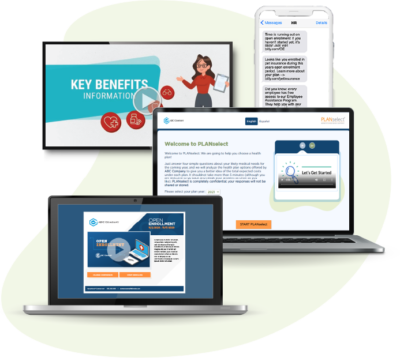 This year’s federal tax season has been extended to July 15th due to the COVID-19 health crisis. With everyone under unique and often financial strains, many are examining their finances, searching for ways to save money. Now more than ever, the different needs and questions employees have about their financial and insurance benefits must be addressed. In an increasingly uncertain world, workers are looking to their employers for answers and education about their financial futures. The long-term financial wellness of the average American worker is at risk during this health and economic crisis. But there are ways HR can help workers get through it.
This year’s federal tax season has been extended to July 15th due to the COVID-19 health crisis. With everyone under unique and often financial strains, many are examining their finances, searching for ways to save money. Now more than ever, the different needs and questions employees have about their financial and insurance benefits must be addressed. In an increasingly uncertain world, workers are looking to their employers for answers and education about their financial futures. The long-term financial wellness of the average American worker is at risk during this health and economic crisis. But there are ways HR can help workers get through it.
Where Tax Savings and Benefits Intersect
Health savings accounts (HSAs) are great medical savings and investment tools for employees, particularly those anticipating few medical expenses year to year. The deadlines for contributions to HSAs have also been extended to July 15th for 2020. For employees, HSAs allow them to pay for out-of-pocket expenses from a tax-free savings account. Unused balances roll over year to year. If employees keep these accounts long enough, they can use them on qualifying medical expenses into retirement. If you offer HSAs as part of your worker healthcare coverage, it’s imperative everyone knows about them, knows how to use them and knows how the new deadlines impact them.
 Employees have to know that they can’t use HSA money for anything other than what the IRS considers a “qualifying medical expense.” Doing so could mean paying a penalty in addition to paying taxes on the withdrawn amount. Most employees know they can’t use HSA funds for non-medical purposes. They might not know how much they should have taken out of their monthly paycheck to contribute to their HSA. Even healthy employees who expect to pay very little out of pocket for medical expenses should try to contribute the maximum allowed. This will build a solid medical savings fund for unexpected injury, sudden illness or for retirement. You’ll also have people looking to lower their contribution to reflect immediate financial wellness needs as so many are now adjusting their household budgets.
Employees have to know that they can’t use HSA money for anything other than what the IRS considers a “qualifying medical expense.” Doing so could mean paying a penalty in addition to paying taxes on the withdrawn amount. Most employees know they can’t use HSA funds for non-medical purposes. They might not know how much they should have taken out of their monthly paycheck to contribute to their HSA. Even healthy employees who expect to pay very little out of pocket for medical expenses should try to contribute the maximum allowed. This will build a solid medical savings fund for unexpected injury, sudden illness or for retirement. You’ll also have people looking to lower their contribution to reflect immediate financial wellness needs as so many are now adjusting their household budgets.
To make the most of HSAs, employees need timely information and reminders and, right now, people are primed to absorb the information. With so much uncertainty, people are looking for ways to take action. Examining and taking control of finances is one way people are coping. If you can educate them now on ways to save and budget, they’re going to listen.
Budgeting Basics for Younger Employees
Millennials are getting better at budgeting as they’ve aged, been promoted and entered new financial levels and situations. Still, the next generation entering the workforce is always going to need guidance. As Generation Z increasingly takes on that role, employers can help inexperienced employees better manage their income and benefits to build savings and not outspend their earnings.
Unfortunately, young people often don’t get much training in basic budgeting and managing personal expenses. Regardless of where the blame for that lies, employers have to understand the reality and its impact on their workers’ daily lives (and stresses). As many face unexpected financial hits, this is an opportunity for employers to step in and fill the void. Educate employees and provide access to resources that will help them with difficult steps to better financial security. Help them get through the current trials and plan for their financial future beyond the crisis.
Share digital resources like personal budgeting apps, or even try building similar tools into your company intranet to help your employees as they make decisions. Make sure employees understand the tax implications of various deductions and contributions, like for HSAs or 401(k)s. Set up retirement plans and explain how they work so everyone’s on the same page with the same information. If you have avenues available for investing, now’s the time to explain how they work and where they stand in the current economic situation. Help people focus on the future at the other end of this uncertainty. Few were prepared for the financial impact this crisis will continue to have. The younger generations have had less time to prepare and save, period. But no one living through it will forget or underestimate the need for being prepared in the future.
Retirement Planning for Boomers vs. Millennials
Before the Outbreak
 Most baby boomers have some kind of retirement plan, even if it amounts to selling their house and traveling the country in a van. Some have already started relying on those plans, though the van is probably going to stay put for a while. Millennials aren’t as unprepared for retirement as they once were, but a large portion still have no savings or plan. Of course, both groups are taking a hit right now since planning probably didn’t account for a global pandemic or the economic repercussions that go with it.
Most baby boomers have some kind of retirement plan, even if it amounts to selling their house and traveling the country in a van. Some have already started relying on those plans, though the van is probably going to stay put for a while. Millennials aren’t as unprepared for retirement as they once were, but a large portion still have no savings or plan. Of course, both groups are taking a hit right now since planning probably didn’t account for a global pandemic or the economic repercussions that go with it.
Everyone has to take preparations for retirement seriously. The impact of the current situation on those plans isn’t going to hit everyone in the same way. Companies should provide retirement savings plans that help everyone under normal circumstances. And right now, HR should support and guide each generation in understanding how their planning will be affected in the short and long term.
Conventional wisdom for retirement holds that the younger a person is, the more market risk they can take on. As they age, their investments become less aggressive. However, financial advisors were starting to recognize this general pattern of planning more risk into young people’s portfolios and shifting to surer investments over time wasn’t as effective as it once had been. In the wake of the current crisis, any conventional wisdom may become completely obsolete.
Long-Term Repercussions
Social security remains functioning amid the health crisis. They’re still sending checks to retired boomers and other seniors who rely on that source of income. 401(k)s are taking a hit with the stock market’s fluctuations. But boomers carry less debt than millennials and other younger generations. That means the long-term impact looks different for each.
 Student loan repayments have been suspended in most cases, until the worst of the health crisis passes. Of course, there is no date for when that will be. But for many millennials, those student loan payments are part of why they haven’t been able to build savings in the first place. The chunk of their paycheck that might have gone into a savings account has been paying down interest. Or they may have recently paid off student loan debt and had shifted to paying down credit card debt. Either way, without that kind of savings cushion, some who do have 401(k)s or other retirement plans may be dipping into them to make ends meet if a partner has been laid off or to supplement a reduced income.
Student loan repayments have been suspended in most cases, until the worst of the health crisis passes. Of course, there is no date for when that will be. But for many millennials, those student loan payments are part of why they haven’t been able to build savings in the first place. The chunk of their paycheck that might have gone into a savings account has been paying down interest. Or they may have recently paid off student loan debt and had shifted to paying down credit card debt. Either way, without that kind of savings cushion, some who do have 401(k)s or other retirement plans may be dipping into them to make ends meet if a partner has been laid off or to supplement a reduced income.
Retirement planning during economic recovery is going to look different for each generation. Some millennials may well be starting from scratch, while boomers who were still working before may retire in droves. HR needs to prepare for questions on all fronts as workers face difficult financial wellness decisions that may depend on what you already have in place.
Helping Employees Make the Right Decisions
At the end of the day, employee communications technology is for helping employees engage with their work and find satisfaction. When workers trust the company to help them and do the right thing, they’ll be more engaged, they’ll work harder and improve. How your company responds to this crisis and worker concerns is going to shape their trust and engagement through these trying times and beyond. For most, this means responding to their immediate financial wellness concerns.
The easiest way HR can help employees right now is by providing the tools to make the best possible decisions for themselves and their families. Whether it’s financial wellness information to help workers adjust their budgets or file their taxes to get their refund faster, show them you’re there for them. Video communications and other on-demand resources will help empower them during a time they may be feeling powerless. However you choose to communicate, make sure they keep hearing from you.






